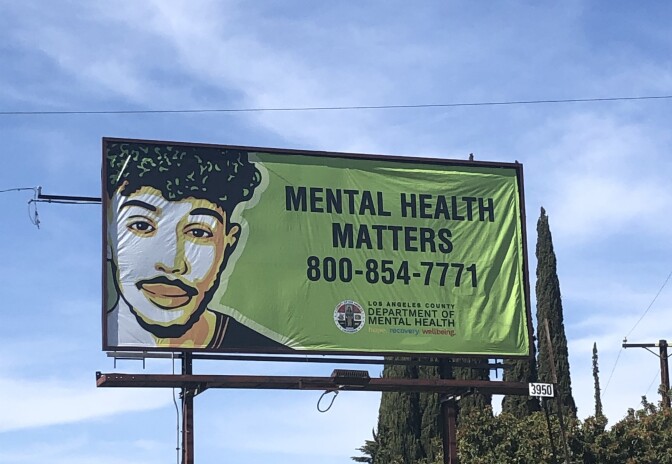This story is free to read because readers choose to support LAist. If you find value in independent local reporting, make a donation to power our newsroom today.
LA County Moves To Expand Use Of Unarmed Clinicians For Mental Health Crises

The L.A. County Board of Supervisors voted Tuesday to expand the use of unarmed clinicians to respond to people experiencing a mental health crisis.
Thanks to federal COVID-19 relief legislation, starting next year the county will have increased funds available for handling such crisis calls. The supervisors directed the Department of Mental Health to come up with a plan to use some of that money to ramp up the county’s Psychiatric Mobile Response Teams (PMRT).
The Department of Mental Health runs the Mobile Response Teams; they’re an unarmed alternative to the Mental Evaluation Teams (MET) at the Sheriff’s Department, which pair up a specially-trained deputy and a DMH clinician.
Both department’s teams go out on thousands of psychiatric emergency calls every year. In 2020, the Mobile Response Teams went out on more than 20,000 calls, with roughly 7,000 of those leading to a patient being placed in a hospital.
Assistance For Mental Health Crises Or Support
If you or someone you know is in crisis and needs immediate help, call or text the Suicide and Crisis Lifeline at 988, or visit the 988 website for online chat.
For more help:
- Find 5 Action Steps for helping someone who may be suicidal, from the National Suicide Prevention Lifeline.
- Six questions to ask to help assess the severity of someone's suicide risk, from the Columbia Lighthouse Project.
- To prevent a future crisis, here's how to help someone make a safety plan.
- Los Angeles County Department of Mental Health’s 24/7 Help Line (Spanish available): 800-854-7771.
- East Los Angeles Women’s Center 24/7 crisis hotline (Spanish available): 800-585-6231.
Crisis Text Line: Text HOME to 741741 for 24/7 crisis counseling.
But PMRT doesn’t have the resources to handle every call that comes in. It has about 30 teams for the entire county, and demand is so high that when it does take on a case, response times can be several hours, or even a whole day, depending on staffing.
“There is absolute chaos going on out there,” said Mark Gale, Criminal Justice Chair for the greater L.A. County chapter of the National Alliance on Mental Illness. “I talk to families all the time and there’s just not enough well-trained clinicians out there to respond to crises,” he said.
“We are definitely short teams currently,” said Dr. Amanda Ruiz, acting deputy director of the Department of Mental Health’s Intensive Care Division.
Because of the staffing shortfalls at PMRT and at the Sheriff’s MET, thousands of other crisis calls are handled by routine deputy patrols, which experts say increases the potential for a bad outcome.
That happened twice in March.
On March 14, deputies shot and killed David Ordaz, Jr. in front of several family members while he was experiencing a mental health crisis. A little more than two weeks later, a deputy shot and critically wounded Isaias Cervantes during a psychiatric episode.

Supervisors Kathryn Barger and Janice Hahn co-authored the motion approved by the board Tuesday. It calls for a plan to make the PMRT available 24/7 — the teams currently operate full-time only during business hours on weekdays; on weekends and after 5 p.m. on weekdays they rely on voluntary overtime staffing, and they don’t respond at all between the hours of 2-8 a.m., according to the motion.
The supervisors also called for a strategy to expand PMRT in areas served by the County Fire Department, “prioritizing regions with the worst health inequities and highest needs.”
County staffers have two months to report back with their plan.








